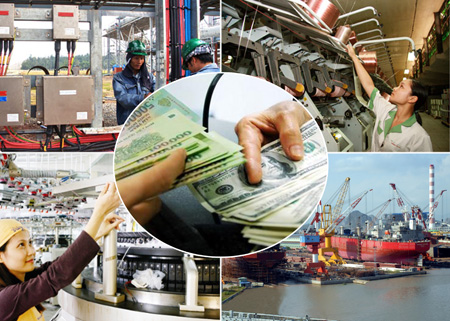Economic restructuring has been an important and consistent issue in the Party's policies and guidelines for many years, and at the same time, there is a connection between the restructuring processes and scope. From mainly focusing on a few sectors, it has now expanded to the entire economy.
With the formation of a reasonable and effective structure in each industry and field; between industries, fields and the whole economy, many national products based on new and high technology have been developed; creating a breakthrough in the competitiveness of a number of key economic sectors and a substantial and clear change in the growth model, productivity, quality, efficiency, competitiveness, enhancing the autonomy, adaptability and resilience of the economy. Restructuring the economy associated with renewing the growth model towards ensuring macro stability, improving productivity, quality, efficiency and competitiveness based on the foundation of science and technology, innovation and high-quality human resources, contributing to the recovery and development of the socio-economy, building a self-reliant economy, enhancing the adaptability and resilience of the economy. Continuing to restructure the economy on the basis of inheritance and development, both comprehensively and with focus and key points; Prioritize the development of a number of industries and fields with large room and the ability to catch up, progress together, and surpass the region and the world, and three important areas: restructuring investment, focusing on public investment; restructuring the financial market, focusing on credit institutions; restructuring state-owned enterprises, focusing on economic groups and state-owned corporations. [caption id="attachment_1262504" align="aligncenter" width="800"] Photo Collection[/caption] Mobilize, allocate and effectively use all resources for development, in which internal resources are strategic, fundamental, long-term and decisive; external resources are important. Highly promote human factors, cultural values, traditions, history, self-reliance, and national solidarity in conjunction with maximizing opportunities, advantages and being in line with development trends in the world, not missing a beat in the world economic recovery trend as well as the process of restructuring the global production and supply chain. Aiming for 2025, the average labor productivity growth rate is over 6.5%/year, in which the labor productivity growth rate of the processing and manufacturing industry reaches 6.5 - 7%/year, the labor productivity growth rate of key economic regions and 05 centrally-run cities is higher than the average labor productivity growth rate of the whole country; Increase the contribution of science and technology, innovation to growth, in which total factor productivity (TFP) reaches about 45% of GDP. Narrow the gap in national competitiveness with countries in the ASEAN-4 group, especially for indicators of institutions, infrastructure, and human resources. Ensure that the total average social investment capital for 5 years is about 32 - 34% of GDP. Improve the quality of public investment management institutions to reach international standards. The on-balance sheet bad debt of the entire credit institution system is maintained at below 3%, gradually developing a professional and sustainable debt trading market. All commercial banks apply the Basel II standard method. Focus on completing the goals of restructuring public investment, state budget, the system of credit institutions and public service units. Continue to effectively restructure public investment, improve the quality of public investment management institutions; Improve factors to enhance the economy's capital absorption capacity, especially the allocation and disbursement of public investment capital. Promote decentralization and delegation of authority, ensure unified, effective and efficient management; promote the initiative, creativity and responsibility of each level and each sector, enhance the responsibility of leaders associated with effective inspection and supervision mechanisms; resolve difficulties in the investment management process. Strictly handle violations of the law, corruption, negativity, causing loss and waste in public investment. Public investment leads private investment to create breakthroughs in attracting capital from the domestic and foreign private sector; focus capital on key sectors and fields, key projects and works with spillover effects, creating momentum for socio-economic development. Focus resources on developing socio-economic infrastructure, especially infrastructure for growth-driving regions, infrastructure to promote regional and sectoral linkages, digital economic infrastructure, education , healthcare, culture, disadvantaged areas, areas heavily affected by epidemics, natural disasters, and climate change; ensure a better balance between methods in developing transport infrastructure. Continue to restructure state budget expenditures in a sustainable manner, increase the proportion of development investment expenditures, reduce the proportion of regular expenditures, support the effective implementation of socio-economic development goals; strictly implement the principle of borrowing only for development investment expenditures. Research the effective use of public procurement policies to promote digital transformation, information security, support innovative enterprises, and enhance science and technology potential. Continue to restructure public debt in a sustainable manner, ensure public debt safety, borrow within the repayment capacity of the state budget, in accordance with the borrowing capacity and the level of loan absorption, maintain and consolidate fiscal space to respond to market risks or economic shocks, and strictly control the contingent debt obligations of the state budget. [caption id="attachment_1262506" align="aligncenter" width="450"]
Photo Collection[/caption] Mobilize, allocate and effectively use all resources for development, in which internal resources are strategic, fundamental, long-term and decisive; external resources are important. Highly promote human factors, cultural values, traditions, history, self-reliance, and national solidarity in conjunction with maximizing opportunities, advantages and being in line with development trends in the world, not missing a beat in the world economic recovery trend as well as the process of restructuring the global production and supply chain. Aiming for 2025, the average labor productivity growth rate is over 6.5%/year, in which the labor productivity growth rate of the processing and manufacturing industry reaches 6.5 - 7%/year, the labor productivity growth rate of key economic regions and 05 centrally-run cities is higher than the average labor productivity growth rate of the whole country; Increase the contribution of science and technology, innovation to growth, in which total factor productivity (TFP) reaches about 45% of GDP. Narrow the gap in national competitiveness with countries in the ASEAN-4 group, especially for indicators of institutions, infrastructure, and human resources. Ensure that the total average social investment capital for 5 years is about 32 - 34% of GDP. Improve the quality of public investment management institutions to reach international standards. The on-balance sheet bad debt of the entire credit institution system is maintained at below 3%, gradually developing a professional and sustainable debt trading market. All commercial banks apply the Basel II standard method. Focus on completing the goals of restructuring public investment, state budget, the system of credit institutions and public service units. Continue to effectively restructure public investment, improve the quality of public investment management institutions; Improve factors to enhance the economy's capital absorption capacity, especially the allocation and disbursement of public investment capital. Promote decentralization and delegation of authority, ensure unified, effective and efficient management; promote the initiative, creativity and responsibility of each level and each sector, enhance the responsibility of leaders associated with effective inspection and supervision mechanisms; resolve difficulties in the investment management process. Strictly handle violations of the law, corruption, negativity, causing loss and waste in public investment. Public investment leads private investment to create breakthroughs in attracting capital from the domestic and foreign private sector; focus capital on key sectors and fields, key projects and works with spillover effects, creating momentum for socio-economic development. Focus resources on developing socio-economic infrastructure, especially infrastructure for growth-driving regions, infrastructure to promote regional and sectoral linkages, digital economic infrastructure, education , healthcare, culture, disadvantaged areas, areas heavily affected by epidemics, natural disasters, and climate change; ensure a better balance between methods in developing transport infrastructure. Continue to restructure state budget expenditures in a sustainable manner, increase the proportion of development investment expenditures, reduce the proportion of regular expenditures, support the effective implementation of socio-economic development goals; strictly implement the principle of borrowing only for development investment expenditures. Research the effective use of public procurement policies to promote digital transformation, information security, support innovative enterprises, and enhance science and technology potential. Continue to restructure public debt in a sustainable manner, ensure public debt safety, borrow within the repayment capacity of the state budget, in accordance with the borrowing capacity and the level of loan absorption, maintain and consolidate fiscal space to respond to market risks or economic shocks, and strictly control the contingent debt obligations of the state budget. [caption id="attachment_1262506" align="aligncenter" width="450"]  Photo Collection[/caption] Amending and supplementing laws on taxes and fees according to market principles, in line with international practices, associated with restructuring revenue sources, expanding and preventing tax base erosion, covering revenue sources, improving the effectiveness and efficiency of tax management, applying reasonable tax rates, aiming for a synchronous tax system with a sustainable structure, ensuring reasonable mobilization of resources for the state budget. Reviewing and perfecting tax incentive policies to encourage start-ups, innovation, research, development and application of scientific and technological advances, encouraging joint ventures, associations, upgrading value chains, developing supporting industries, increasing the proportion of localization. Continuing to restructure the system of credit institutions, perfecting institutions in the monetary and banking sectors in line with market principles, ensuring the safety, soundness and stability of the system; enhancing transparency, competitiveness, in line with international practices and new development trends. Continue to improve the legal framework on bad debt handling, end cross-ownership; promote the application of science and technology, especially digital technology in the banking sector and develop modern banking products and services. Strengthen the financial capacity, management and credit quality of credit institutions and people's credit funds to ensure safe, effective, stable and sustainable operations. Improve policies and regimes on public service units in the direction of ensuring consistency and synchronization between legal regulations to meet practical requirements in sectors and fields. Convert qualified public service units into joint stock companies; promote the mechanism of autonomy and self-responsibility, create conditions to promote proactiveness, improve the efficiency of using human resources, assets and finances of the State. Implement correct and adequate calculation of public service prices, ensuring publicity and transparency; Strengthen socialization, create a healthy and equal competitive environment in providing public services among units and organizations of all economic sectors, establish a market for some public services under state management and regulation.
Photo Collection[/caption] Amending and supplementing laws on taxes and fees according to market principles, in line with international practices, associated with restructuring revenue sources, expanding and preventing tax base erosion, covering revenue sources, improving the effectiveness and efficiency of tax management, applying reasonable tax rates, aiming for a synchronous tax system with a sustainable structure, ensuring reasonable mobilization of resources for the state budget. Reviewing and perfecting tax incentive policies to encourage start-ups, innovation, research, development and application of scientific and technological advances, encouraging joint ventures, associations, upgrading value chains, developing supporting industries, increasing the proportion of localization. Continuing to restructure the system of credit institutions, perfecting institutions in the monetary and banking sectors in line with market principles, ensuring the safety, soundness and stability of the system; enhancing transparency, competitiveness, in line with international practices and new development trends. Continue to improve the legal framework on bad debt handling, end cross-ownership; promote the application of science and technology, especially digital technology in the banking sector and develop modern banking products and services. Strengthen the financial capacity, management and credit quality of credit institutions and people's credit funds to ensure safe, effective, stable and sustainable operations. Improve policies and regimes on public service units in the direction of ensuring consistency and synchronization between legal regulations to meet practical requirements in sectors and fields. Convert qualified public service units into joint stock companies; promote the mechanism of autonomy and self-responsibility, create conditions to promote proactiveness, improve the efficiency of using human resources, assets and finances of the State. Implement correct and adequate calculation of public service prices, ensuring publicity and transparency; Strengthen socialization, create a healthy and equal competitive environment in providing public services among units and organizations of all economic sectors, establish a market for some public services under state management and regulation.Phuong Quang



































































































Comment (0)